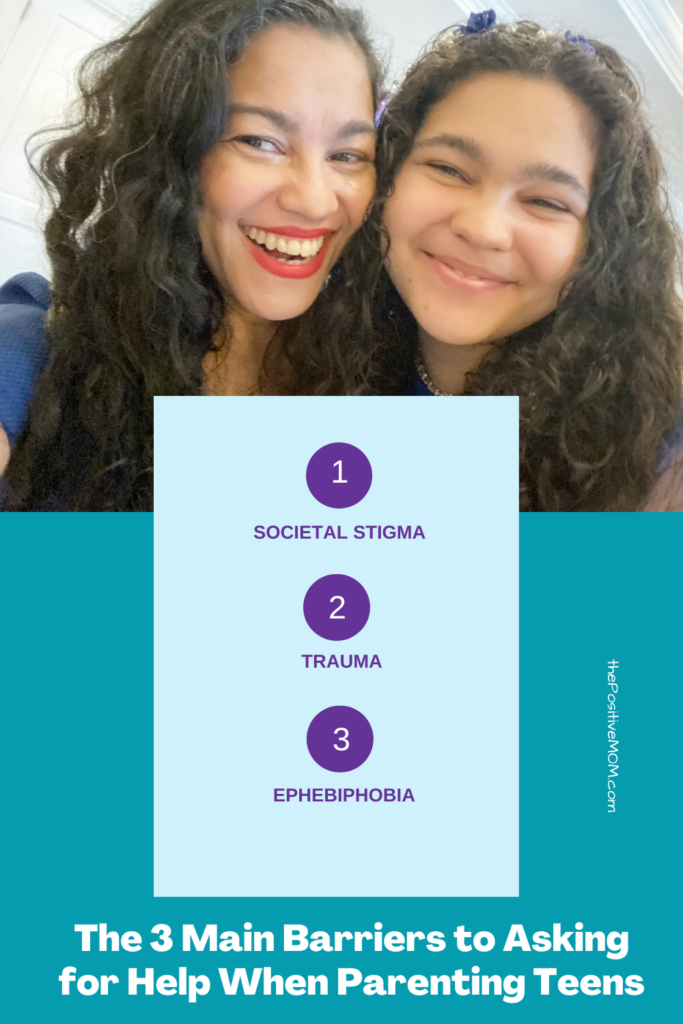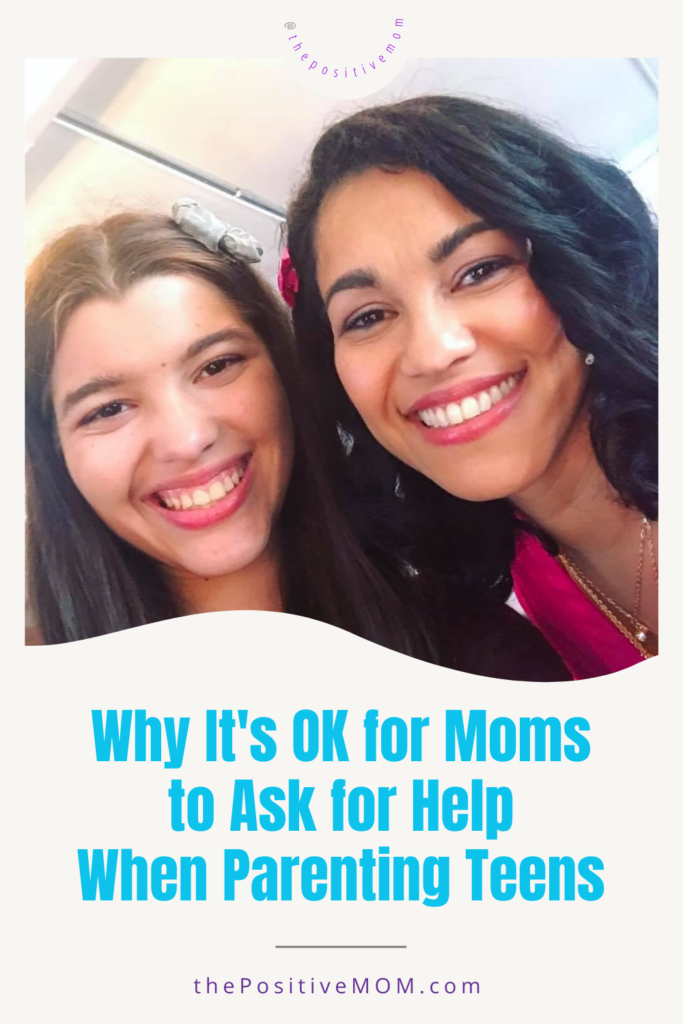
Do you ever struggle to ask for help? You’re not alone.
As a mom of four daughters (ages 21, 20, 10, and 4) and as the founder of a global community for moms, I have realized that we all struggle with asking for help, even when we most need it.
When we are new moms and our kids are small, everyone offers guidance, advice, tips, tricks, and hacks. Sometimes it can be frustrating because everyone is chiming in to tell you what to do, but it also feels very supportive.
I remember feeling very overwhelmed as a brand-new mom. My studies and my corporate career were my main focus when I lived in my home country, the Dominican Republic, so I didn’t have any experience in caring for babies.
I read as many books as I could and I took advantage of the military parenting classes offered on base, but I felt like I would never know what I was doing. All of my family was back home and not only video calls were something we only knew from the Jetsons, but even a regular phone call was outrageously expensive and if you were lucky to get a calling card, it was really far way and I didn’t know how to drive.
When Things Begin to Change
As children grow, you become this “veteran mom.” It becomes harder to ask for help because you’re supposed to have it all together, and “you’ve got this.”
We take on a lot and impose unfair expectations on ourselves. By this point, very few people are quick to offer assistance, and we are overcome with guilt and shame, feeling like we’ve dug our own hole.
Although rationally, I know the hole is not ideally where I want to be, it’s familiar. Plus, I’m so exhausted that trying to get out feels too hard, and sometimes impossible.
But the truth is… we don’t belong in the hole, and isolating ourselves is not the solution.
Why Moms of Teens Should Ask for Help
Parenting was never meant to be a solo endeavor. The old saying, “It takes a village to raise a child,” is not cliché – it’s a warning that can help us navigate motherhood with more ease and grace, not only for ourselves as moms, but for our children, as well.
While most acknowledge that parenting is a challenging journey that benefits from collaboration, support, and shared experiences, we don’t often admit it to others.
However, it’s not our fault. Here are the three main barriers that can get in the way:
- Societal stigma
- Trauma
- Ephebiphobia

Let’s unpack them one by one!
Societal Stigma
We generally don’t ask for help because we fear criticism and judgment from other moms and even our own family members.
Society has conditioned us to believe that asking for help is for the weak and a sign of failure. In reality, it’s the opposite. Asking for help is a sign of strength.
We often experience guilt and feel we are being viewed as inadequate or incapable because of a societal or cultural belief that “a mother should know” or that we must be self-reliant, self-sufficient, and self-sacrificial.
These traits can be noble, but in my experience, they can be inappropriate and detrimental unless there is a balance. As an immigrant to the U.S., it feels overwhelming to be in the middle of two different cultures and taxing to want to conform to one, let alone both.
Another aspect of this issue is that we pride ourselves on being “supermoms,” which is actually code for “perfection.” Of all the mythical creatures we believe in, the “perfect mom” is the most damaging to our self-esteem and our children, especially in the adolescent years, when they are developing their sense of identity.
Trauma Triggers
When we’ve been through Adverse Childhood Experiences (ACEs) and other traumas, it’s normal to want to have a sense of control by doing it all ourselves, and it is natural to become perfectionistic. These trauma symptoms can lead to isolation and make asking for help feel extra uncomfortable and awkward so we try to avoid that feeling at all costs.
In addition, we are encouraged to deny, dismiss, and downplay our pain, and this can lead to disease, dysfunction, and disconnection.
As a multiple-trauma survivor with an ACEs score of 9 out of 10, I have struggled with destructive hyperindependence since my youth and I’ve realized how much I suppressed and bypassed my emotional suffering, trying to be “strong” and “positive.”
The 10 ACEs were defined as the following experiences before one’s 18th birthday:
- Physical, sexual or verbal abuse
- Physical or emotional neglect
- Separation or divorce
- A family member with mental illness
- A family member addicted to drugs or alcohol
- A family member who is in prison
- Witnessing a parent being abused
It has taken a lot of inner work to acknowledge and heal my ACEs and I’m still very much a work in progress.
In this process, I’ve realized that there’s truly strength in numbers. Even the Bible has phrases like “two are better than one,” (Ecclesiastes 4:9) and predicts better outcomes when “two or three are gathered” (Matthew 18:20).
I’ve also come to understand that being positive is not about invalidating our emotional pain, but processing it so we can move forward.
Ephebiphobia
Ephebiphobia is the “fear of teenagers.” It’s a widely known belief that teenagers are scary and difficult. This exaggerated negative view of teens may be why moms are offered very little to no support during the adolescent years when we need it most.
While it’s important to acknowledge the emotional, social, and mental challenges unique to this developmental stage, we must recognize that parenting is challenging no matter the child’s age.
Having daughters at such different stages of development has taught me a lot about the misguided ways in which teens are perceived and represented. This has led me to become passionate about spreading awareness and partnering with organizations like the Center for Parent and Teen Communication (CTPC) to make a positive difference in this matter.
These three factors can lead us to feel alone in parenting our children, and especially our teens. We often feel like we have no one to turn to for guidance, advice, or support.
The Benefits of Asking for Help When Raising Teenagers
When we drop the outdated facade of the perfect mom who has it all figured out and instead are willing to be vulnerable and reach out for support, we can:
- Model healthy behavior that will help our teens in their journey to becoming well-adjusted adults
- Feel supported by others, so we have the space to act in more supportive ways to our teens. Supportive parenting starts by being open to receiving support
- Give our children access to a network of supportive advisors so they are not alone when they resist parental advice or direction
- Create a safe space for teens to ask for support, helping them avoid burnout and teaching them the power of teamwork and collaboration
- Become able to be more present with our children because we enjoy better mental and emotional health
- Improve our parenting skills as we discover new resources and learn from other moms, caregivers, and professionals who share valuable insights about parenting teens.
You may start to feel like this idea might just be worth it – I assure you it sure is.
Watch Out for This Pitfall When Asking for Help
As you read the list of benefits of asking for help, I’m sure you noticed that asking for help is a proactive step to protect your physical, mental, and emotional well-being. It can help you set a positive example for your teens, and help break the stigma around receiving support.
However, because we often put off asking for help until there is a crisis or breakdown when we do ask, it can come off wrong.
Through trial and error, I’ve learned that when we discuss our struggles, it’s essential to respect our teens’ privacy and to use language that doesn’t blame or shame them.
Although stressful at times, their attitudes and behavior are part of their development process. As you ask for help, focus on how you feel and what kind of support you need or would love.
Let’s Start Asking for Help in Parenting Teens
This is not the part where I will tell you that admitting I need help has gotten easier over the years. I still feel like I might break out in hives every time I do. Thoughts of how I am somehow neglecting my responsibilities and how I shouldn’t delegate my job almost always come up.
But I will tell you this: when we have the courage to ask for help despite the discomfort, we can be healthier and happier. I always say that the best gift you can give your child is a healthier, happier you.
Asking for help is not a sign of weakness. It’s a powerful choice that deepens your connection with your teenager and demonstrates your strength and commitment to being a positive mom.
Founder of the Positive MOM® and creator of the S.T.O.R.Y. System: a blueprint to craft and share powerful stories that will transform your results and help others do the same. Dr. Elayna Fernández is a single mom of 4, an award-winning Storyteller, Story Strategist, and Student of Pain. She’s a bestselling author, internationally acclaimed keynote speaker, and 5x TEDx speaker. She has spoken at the United Nations, received the President’s Volunteer Lifetime Achievement Award, and was selected as one of the Top Impactful Leaders and a Woman of Influence by SUCCESS Magazine. Connect with Elayna at thepositivemom.com/ef and follow @thepositivemom. To receive a gift from Elayna, click HERE.

Want to support the Positive MOM blog?
The mission of the Positive MOM blog is to help moms break trauma cycles, find peace, and feel emotionally whole, so they can practice supportive parenting and create a positive and healthy environment for their children. If you found Elayna’s content valuable, please consider donating a love offering to enable her to keep creating content and helping more moms worldwide. Donate HERE.

